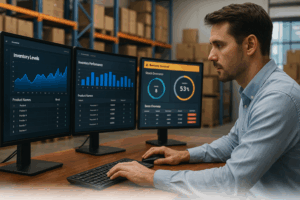Explore strategies that can help your organization decarbonize freight networks for a greener future!
As the world grapples with the challenges of climate change and its far-reaching impacts, sustainable transportation has emerged as a critical priority for governments, businesses, and individuals. The freight industry, responsible for transporting goods across the globe, plays a significant role in carbon emissions. Decarbonizing freight networks has become a pressing imperative to reduce the environmental footprint of transportation while ensuring the continued movement of goods to meet societal needs. This article delves into the importance of sustainable transportation, the challenges it faces, and the strategies to decarbonize freight networks for a greener future.
The Importance of Sustainable Transportation
Transportation is one of the major contributors to greenhouse gas emissions, with the freight sector accounting for a considerable share of these emissions. As global trade and demand for goods increase, it becomes imperative to address the environmental impact of freight transportation. Sustainable transportation offers several key benefits:
- Mitigating Climate Change: Transitioning to sustainable freight networks significantly reduces carbon emissions, helping combat climate change and its adverse effects, such as extreme weather events, rising sea levels, and disruptions to ecosystems.
- Improving Air Quality: Sustainable transportation solutions, such as electrification and alternative fuels, contribute to improved air quality, reducing harmful pollutants that adversely affect human health and the environment.
- Resource Conservation: Sustainable practices in freight transportation lead to more efficient use of resources like fuel and materials, resulting in cost savings and reduced pressure on natural resources.
- Enhancing Resilience: A sustainable freight network is more resilient to external shocks, such as fuel price fluctuations or regulatory changes, providing long-term benefits to businesses and economies.
Challenges in Decarbonizing Freight Networks
- While the benefits of sustainable transportation are evident, several challenges hinder the complete decarbonization of freight networks:
- Technological Hurdles: Transitioning to low-carbon or zero-emission technologies, such as electric trucks or hydrogen-powered vessels, requires significant advancements in technology and infrastructure development.
- High Costs: Investing in sustainable transportation solutions often comes with higher upfront costs, which can deter some businesses from making the switch, especially smaller operators with limited financial resources.
- Long Transition Period: The global freight industry is vast and complex, making the transition to sustainable practices a time-consuming process that demands coordinated efforts from multiple stakeholders.
- Regulatory Frameworks: Inconsistent or inadequate regulatory frameworks and policies may hinder the adoption of sustainable practices. Clear and supportive policies are crucial to incentivize and accelerate the decarbonization of freight networks.
Strategies for Decarbonizing Freight Networks
- Electrification: Electric vehicles (EVs) offer a promising solution for decarbonizing freight transportation. Governments and businesses can invest in electrifying truck fleets, delivery vans, and rail systems to reduce emissions and promote the use of renewable energy sources.
- Alternative Fuels: Exploring and adopting alternative fuels, such as biofuels, hydrogen, or natural gas, can significantly reduce the carbon footprint of freight networks. These fuels offer the advantage of being more environmentally friendly and compatible with existing infrastructure.
- Efficient Logistics and Routing: Optimizing logistics and routing through advanced technologies and data analytics can reduce unnecessary mileage, minimize fuel consumption, and lower emissions.
- Intermodal Transportation: Combining multiple transportation modes, such as rail, road, and sea, through intermodal freight transport can lead to more efficient and sustainable supply chain management.
- Collaboration and Partnerships: Governments, businesses, and industry associations must collaborate to create a supportive ecosystem for sustainable transportation. Partnerships can foster knowledge sharing, research, and joint initiatives to address challenges and promote best practices.
- Incentives and Policies: Governments can incentivize the adoption of sustainable practices by offering tax benefits, grants, or subsidies to businesses investing in eco-friendly technologies and practices. Additionally, robust regulatory frameworks and emissions standards can accelerate the decarbonization process.
Decarbonizing freight networks is a crucial step in achieving sustainable transportation and combating climate change. The freight industry must embrace innovative technologies and sustainable practices to reduce its environmental impact while continuing to meet the growing demand for goods. Governments, businesses, and individuals all have a role to play in driving the transition towards a greener and more sustainable future. Through collaborative efforts, supportive policies, and technological advancements, decarbonizing freight networks becomes an achievable goal, paving the way for a cleaner and more resilient global supply chain.
The Perfect Planner Team is here if you have any questions about Sustainable Transportation, and we offer a free consultation service. If you would like to connect with us on this article or any other topic, please message us on LinkedIn, shoot us an email at info@perfectplanner.io, visit our website at www.perfectplanner.io, or give us a call at 423.458.2979.
Author: Thomas Beil
Publication Date: January 11, 2024
© Copyright 2024 Perfect Planner LLC. All rights reserved.






